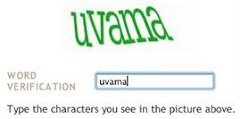Subscribe to:
Post Comments (Atom)
This blog is for the students in English 189, English for Business, at Athabasca University.
Athabasca University

It really does exist!
Our Visitor Globe--click on it!
Followers
Posting to the blog

How to post comments to the course blog There are 5 steps in the process: 1. Click on "comments"--it's a line at the bottom of each posting on the blog. 2. Type your answer in the "Leave Your Comment" box. 3. Complete the word verification process (type the squiggly letters you see in the box). 4. Choose an identity. Generally, unless you already have a Blogger ID, select "Name/URL" and then type your first name (we must be able to identify you to give you credit for your posts) into the box that appears. 5. Click on "publish your comment".
STUDENT AWARDS
Check out the Student Awards web site for all the details.
DEFINITIONS
Clause: A clause is a group of words containing a subject and a verb.
Independent clause: A clause that can be used alone as a sentence and that does not need any other grammatical construction: e.g. He hit the ball over the fence.
Dependent clause: A clause that cannot form a separate sentence; there must be an independent clause for it to modify: e.g. When Peter played baseball, he hit the ball over the fence.
Phrase: A group of words used together to express an idea but without a subject and a verb: e.g. In the game yesterday, he hit the ball over the fence.
Independent clause: A clause that can be used alone as a sentence and that does not need any other grammatical construction: e.g. He hit the ball over the fence.
Dependent clause: A clause that cannot form a separate sentence; there must be an independent clause for it to modify: e.g. When Peter played baseball, he hit the ball over the fence.
Phrase: A group of words used together to express an idea but without a subject and a verb: e.g. In the game yesterday, he hit the ball over the fence.
GRAMMAR GIRL!
For a humourous look at grammar and some of the stickier grammatical situations, check out Grammar Girl. There is a site called Quick and Dirty Tips, and there is also a series of podcasts available. A book on the same topic has just been published. For those of you who are on Facebook, you might like to become a fan of Grammar Girl.
BUSINESS VOCABULARY
Check out this video site that explains a number of business terminologies. There are a number of related sites.
IDIOMS
If English is not your first language, then English idioms are probably difficult for you. The BBC has a site that provides interesting and crazy videos to explain a variety of idioms.
PUNCTUATION BASICS
1. When using an introductory phrase, remember to set it off with a comma.
2. If you have an introductory dependent clause, set it off with a comma.
3. Two independent clauses can be more difficult; use a semicolon to separate them if there is no coordinating conjunction, but use a comma if there is a one.
2. If you have an introductory dependent clause, set it off with a comma.
3. Two independent clauses can be more difficult; use a semicolon to separate them if there is no coordinating conjunction, but use a comma if there is a one.
CONJUNCTIONS
Coordinating Conjunctions (FANBOYS)
For
And
Nor
But
Or
Yet
So
Subordinating Conjunctions (WISH ABOUT)
Who, what, where, when, why, which, whether, while
I
Since, so that
How
As, after, although
Before, because
Once
Unless, until
Than, that, though
For
And
Nor
But
Or
Yet
So
Subordinating Conjunctions (WISH ABOUT)
Who, what, where, when, why, which, whether, while
I
Since, so that
How
As, after, although
Before, because
Once
Unless, until
Than, that, though
SPELLING TEST
Blog Archive
-
▼
2008
(180)
-
▼
November
(15)
- MODULE 1 & ASSIGNMENT 1
- MODULE 2 & ASSIGNMENT 2
- MODULE 3 & ASSIGNMENT 3
- MODULE 4 & ASSIGNMENT 4
- MODULE 5 & ASSIGNMENT 5
- MODULE 6 & ASSIGNMENT 6
- MODULE 7 & ASSIGNMENT 7
- MODULE 8 & ASSIGNMENT 8
- GRAMMAR QUESTION, November 20, 2009
- PUZZLE, Nov. 20th, 2009
- GRAMMAR QUESTION, Nov. 10th, 2009
- PUZZLE, Nov 10th, 2009
- ALL CHANGE! Nov. 10th, 2009
- COMPLETE THE SENTENCE ... Nov. 10th, 2009
- VOCABULARY, Nov. 10th, 2009
-
▼
November
(15)
WHAT’S NEW IN PUNCTUATION?
Have you ever heard of the interrobang? It’s a symbol that is cross between a question mark and an exclamation mark. Check some background information about it, and listen to a CBC podcast that includes a discussion of this interesting punctuation mark. However, there is a word of warning--don’t use it in formal academic writing.
What Did You Say?
On Nytol Sleep Aid -- "Warning: May cause drowsiness."
What was really meant?
2 comments:
I'm having trouble with some Possessive Nouns in the exercises, and I don't want to just look at the answer. I need to understand how to interpret it for other exercises and assignments. Any help?
Brenda: Are you confusing the plural with the possessive? If so, remember that with the possessive you can reword it using the word "of". For instance, "Brenda's book" can be reworded as "the book of Brenda". It gets a little more confusing when the possessive noun is also a plural: note the difference between "the girl's book" (the book of the girl), and "the girls' book" (the book of the girls". You can also identify the possessive noun because of the use of the apostrophe. Try the exercises, check the answers, and if you made mistakes, try to understand those mistakes--that feedback loop will help you understand the grammar. If you still have difficulties that you don't understand, then you should contact your tutor.
Post a Comment